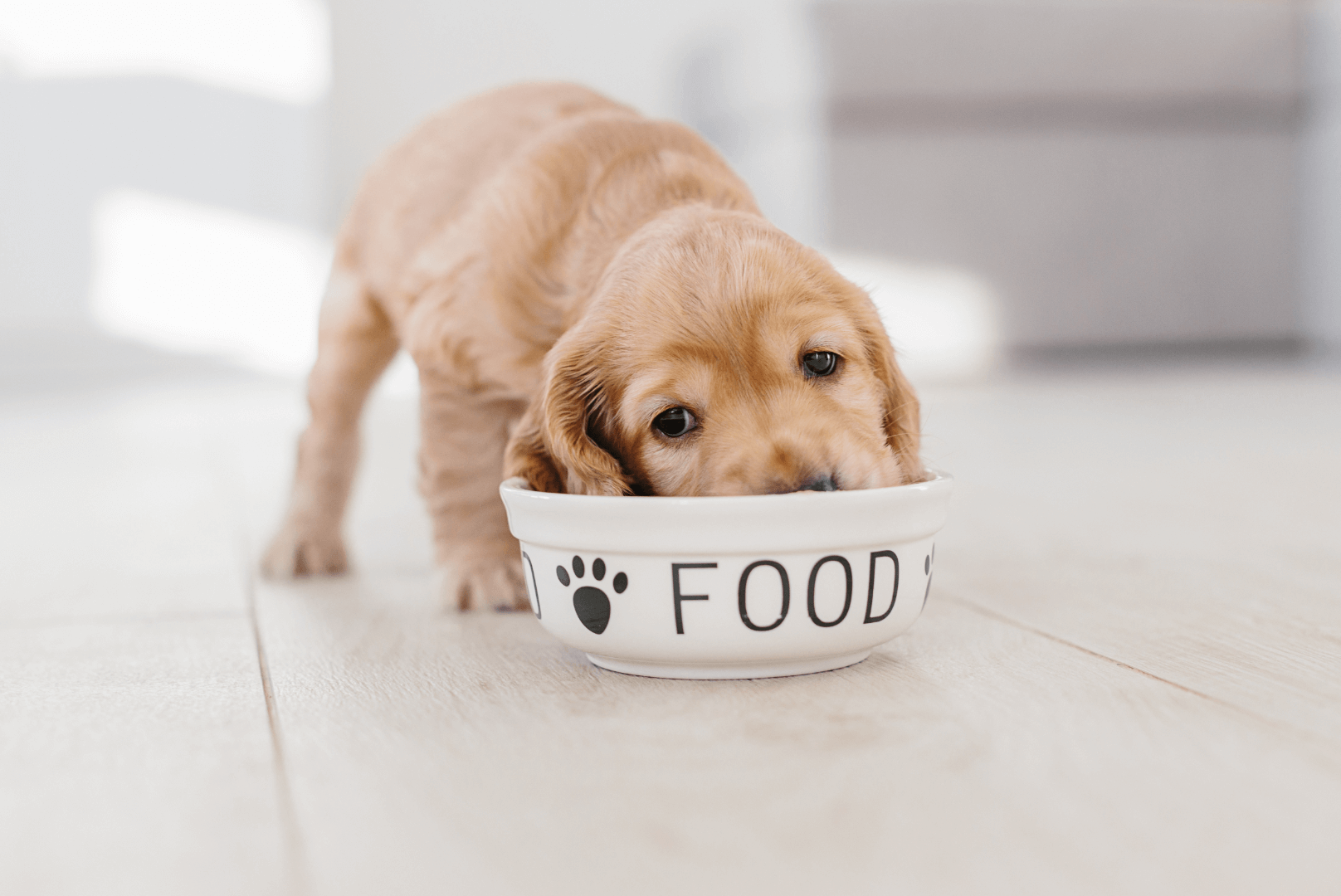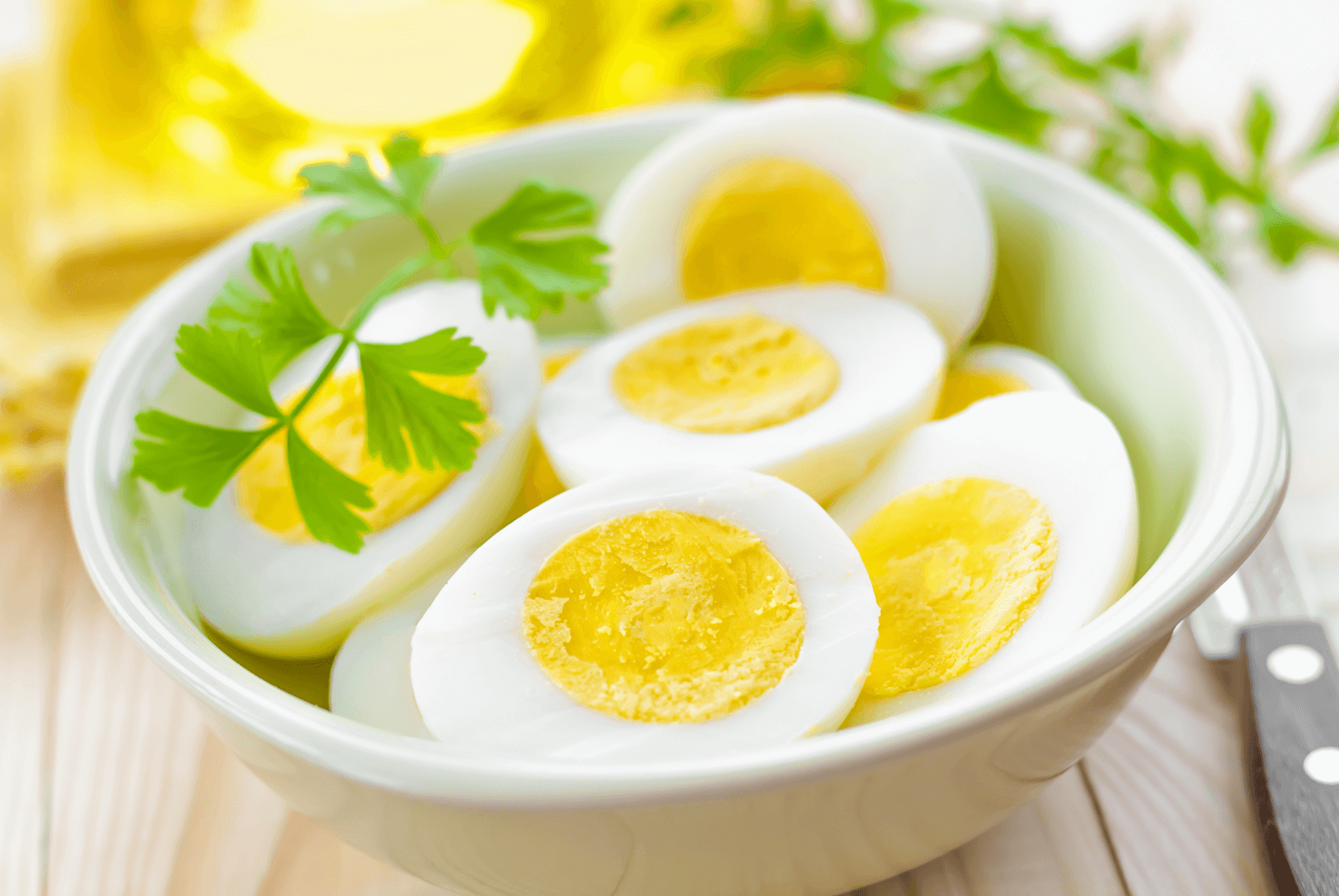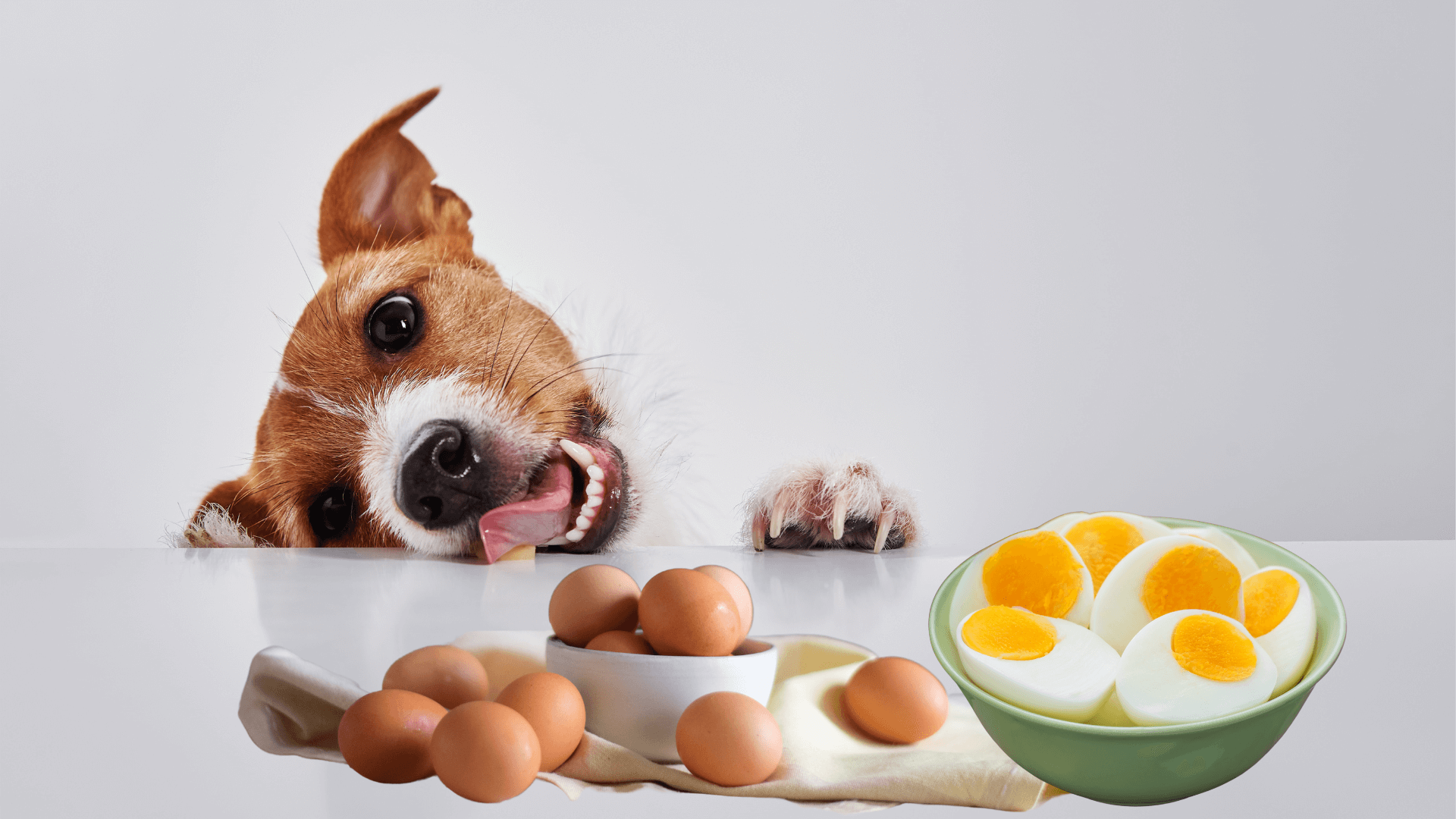As a dog owner who loves cooking and trying out different foods for my lovely furry friends, I often wondered if I could share my egg breakfast with them. I’m not alone in this, as eggs are a breakfast staple for many of us. But the question is, are they safe for our lovely dogs? So, can dogs eat eggs?
I’m going to answer all these questions. I’ll also look at some risks and precautions to keep in mind before giving eggs to our dog. So, if you’re curious about whether eggs are okay for your dog, read on to find out!
Can Dogs Eat Eggs?

The short answer is YES, dogs can eat eggs, and in fact, they can be a valuable addition to our dog’s diet.
Eggs are a rich source of essential nutrients such as protein, vitamins, and minerals, which can contribute to our dog’s overall health. However, there are certain considerations to keep in mind when incorporating eggs into our dog’s diet.
What are the Benefits of Feeding Eggs to Dogs?
As I said, feeding eggs to our dogs can offer a range of health benefits. Here are some key advantages:
Protein Boost
Eggs are little wonders that are not just delicious; they’re the best when it comes to giving our lovely dogs the protein boost they need.
The eggs are not just a tasty treat; they’re packed with high-quality protein that plays a crucial role in building our dog’s muscles, repairing tissues, and ensuring overall growth.
Whether our dog is a playful pup or a wise old companion, the protein in eggs is like a superhero for their health. It’s the key to keeping those tail-wagging moments coming and supporting their well-being from the inside out.
Vitamins and Minerals
Alright, let’s talk about the treasure trove of vitamins and minerals that eggs bring to the table (or bowl, in this case!). These little orbs of goodness aren’t just about protein they’re also packed with a lineup of essential vitamins and minerals that can do wonders for your dog’s well-being.
First, we’ve got the B vitamins, which are like the powerhouse behind our dog’s energy levels. Think of them as the fuel that keeps the engine running smoothly. From B1 to B12, these vitamins play a vital role in energy metabolism, ensuring that our dog has the pep in their step to chase after that favorite ball or go on adventurous walks.
Now, let’s talk minerals, and selenium takes the spotlight. This mighty mineral is a superhero for our dog’s immune system. It’s like having a shield that helps fend off illnesses and keeps our furry friend feeling their best.
A robust immune system means less time dealing with sniffles and more time enjoying the good stuff, like belly rubs and playtime.
Healthy Fats
It’s not just about the protein and vitamins; eggs also bring a rich supply of healthy fats to the table, and our furry friend’s fur is about to thank us in the shiniest way possible.
Imagine your dog with a coat that glistens in the sunlight and feels silky smooth to the touch. That’s the magic of the healthy fats found in eggs. These fats are like the VIPs of skincare for our lovely canine companion, promoting not just an outer layer of fluff but a healthy skin foundation beneath.
Omega-3 and Omega-6 fatty acids are the stars of the show here. They work together to maintain our dog’s skin elasticity, preventing dryness and itchiness. It’s like giving our pup a spa day from the inside out.
Healthy fats also play a role in reducing inflammation, ensuring that our dog’s skin stays calm and comfortable.
Amino Acids
Eggs are like a nutritional powerhouse, providing a rich source of essential amino acids that play a pivotal role in the symphony of our dog’s physiological functions.
Here’s the fascinating part, while our dog’s body can produce some amino acids on its own, there are others, aptly named essential amino acids, that need to come from their diet. And guess what? Eggs are a fantastic source of these essential amino acids.
When we share an egg with our four-legged friend, we’re essentially providing them with the building blocks they need for muscle development, tissue repair, and overall physiological harmony. It’s like giving our dog the tools to construct a strong and resilient body from the inside out.
Digestive Health
Let’s explore the often-overlooked realm of digestive health and how eggs, with their magical touch of riboflavin, can play a crucial role in keeping your dog’s tummy in harmony. It’s not just about what goes in; it’s about how well our furry friend’s digestive system processes and absorbs the goodness.
Riboflavin is a vital player in the conversion of food into energy. It acts as a coenzyme, assisting in the metabolism of fats, carbohydrates, and proteins, essentially ensuring that the nutrients from our dog’s meals are efficiently broken down and absorbed.
A digestive system that operates like a well-oiled machine is what riboflavin in eggs brings to the table for our canine companion. It supports the health of the mucous membranes lining the digestive tract, enhancing the absorption of nutrients and contributing to a smoother digestion process.
Can Puppy Eat Eggs?

Puppies, like adult dogs, can benefit from the nutritional content of eggs. In fact, eggs can be particularly beneficial for growing puppies due to their high protein content, which supports muscle development and overall growth.
However, it’s crucial to introduce eggs gradually into a puppy’s diet and monitor for any signs of allergies or sensitivities.
Can Dogs Eat Raw Eggs?
The debate on whether dogs can eat raw eggs is a contentious one. While some advocate for the benefits of raw feeding, it’s essential to be aware of potential risks.
Raw eggs can contain bacteria such as Salmonella, which poses a health risk to both dogs and their human companions.
To minimize the risk of bacterial contamination, it is generally recommended to feed dogs cooked eggs. Cooking eggs thoroughly can eliminate harmful bacteria and make them safer for consumption.
Can Dogs Eat Egg Shell?
Eggshells are a surprising source of calcium, an essential mineral for dogs, especially for maintaining healthy bones and teeth.
However, it’s crucial to prepare eggshells properly before offering them to our dog. Crushed or ground eggshells can be sprinkled over our dog’s food, providing a natural and easily digestible source of calcium.
Ensure that the eggshells are free from any remnants of egg white or yolk, as these components may spoil and pose a risk of bacterial contamination.
Can Some Dogs Be Allergic to Eggs?
Just like humans, dogs can develop allergies to certain foods, including eggs. Signs of an egg allergy in dogs may include itching, hives, gastrointestinal upset, or even more severe reactions.
If you suspect your dog is allergic to eggs, consult your veterinarian for guidance. They may recommend eliminating eggs from your dog’s diet and conducting allergy tests if necessary.
Can Dogs Eat Eggs Everyday?
While eggs offer numerous health benefits, feeding them to your dog every day may not be necessary or advisable.
A balanced and varied diet is key to ensuring that our dog receives all the essential nutrients they need. Consult with your veterinarian to determine the appropriate frequency of egg consumption based on your dog’s individual needs, health status, and dietary requirements.
How Many Eggs Can a Dog Eat in a Day?
The number of eggs a dog can safely consume depends on various factors, including the dog’s size, breed, age, and overall health.
As a general guideline, one or two eggs per week is considered a safe and beneficial amount for most dogs. However, it’s crucial to tailor the quantity to your dog’s specific nutritional requirements and monitor for any adverse reactions.
How to Safely Feed Your Dog Eggs? – Step-by-Step Guide

To ensure our lovely dogs get the best they need to stay healthy in their food, it’s important to introduce new foods gradually and ensure they are prepared in a safe way.
Here’s a step-by-step guide on how to safely feed our dog eggs:
Step 1: Start Gradually
When you’re thinking about adding eggs to your dog’s menu, take it slow and easy. Start off with a small amount to see how your furry friend reacts.
Keep an eye out for any signs of allergies or sensitivities just to make sure everything agrees with their tummy. It’s like dipping their paw into the egg world one step at a time!
Step 2: Choose the Right Cooking Method
When you’re whipping up eggs for your pup, go for the boiled or scrambled route, but keep it plain and simple. Skip the added oil, salt, or seasonings we’re aiming for a clean and dog-friendly dish here.
Boiled eggs can be a great choice because they’re easy on the stomach and still packed with nutrients. Scrambled eggs work too, just make sure they’re cooked without any extras that might upset your dog’s digestive system.
And here’s a biggie: avoid serving up raw eggs. I know, they’re trendy in some human diets, but for our furry friends, it’s all about minimizing the risk of any unwanted bacteria hitching a ride. So, let’s stick to the safe and tasty options, shall we?
Step 3: Monitor Portion Sizes
Portion control is like the secret sauce to a healthy, happy pup. When you’re dishing out those egg treats, keep a close eye on your dog’s size, breed, and unique nutritional requirements. Every dog is different, just like us!
So, if you’ve got a pint-sized pooch, they won’t need the same amount as a big, bouncy buddy. It’s like tailoring a suit one size definitely doesn’t fit all in the doggy dining world.
Moderation is our magic word here. Too much of a good thing can throw off the balance, and we want to keep that diet in harmony. Think of it like a treat, not an everyday feast. That way, our four-legged friend gets the deliciousness without tipping the nutritional scales.
Step 4: Include Eggshells Mindfully
If you’re considering tossing those eggshells into the mix for that extra calcium boost, that’s smart. But, and it’s a big but, let’s do it mindfully.
Give those eggshells a good rinse. I’m talking about thorough cleaning here to ensure we’re not bringing unwanted guests to our canine feast. Once they’re squeaky clean, it’s time to get a bit hands-on.
Crush or grind those eggshells into a fine powder. This helps your dog’s system absorb the calcium more efficiently. It’s like turning eggshells into a canine-friendly supplement! But, here’s the catch keep a close eye on your pup. We’re all about the happy dance, not an unhappy tummy.
Monitor for any signs of adverse reactions. Dogs can be a bit quirky when it comes to trying new things, so observe their reaction closely. If everything seems A-okay, you’ve just added a little extra nutritional punch to their meal. High-fives all around!
Step 5: Consult Your Veterinarian
Before making significant changes to your dog’s diet, consult with your veterinarian. Seriously, they’re like the superheroes of pet health, and consulting with them is a crucial step.
Before you start tweaking your lovely dog’s diet or introducing new foods, schedule a chat with your vet. They’ve got the inside scoop on your dog’s health status, any special needs, and breed-specific quirks. It’s like having a personalized chef for your furry friend.
Your vet can provide tailored guidance that’s like a roadmap for your dog’s diet. They’ll consider factors like allergies, existing health conditions, and whether your pup needs a little extra of this or a bit less of that. It’s like having a nutritional plan crafted just for your unique canine companion.
So, let’s make a date with your vet before you become the chef-in-chief for your dog’s menu. They’ll ensure you’re on the right track for a healthy, happy, and tail-wagging journey.
Can Dogs Eat Eggs – My Verdict!
Eggs can be a valuable and nutritious addition to your dog’s diet when introduced and managed appropriately. From providing essential proteins to supporting overall health, eggs offer a range of benefits for our canine companions. However, responsible pet ownership involves being mindful of potential risks, such as allergies and bacterial contamination, and taking steps to mitigate them.
As with any dietary changes, it’s crucial to consult with your veterinarian before incorporating eggs into your dog’s regular meals. They can provide tailored advice based on your dog’s individual needs, ensuring a balanced and wholesome diet that contributes to a long and healthy life for your furry friend.





There is definately a lot to find out about this subject. I like all the points you made